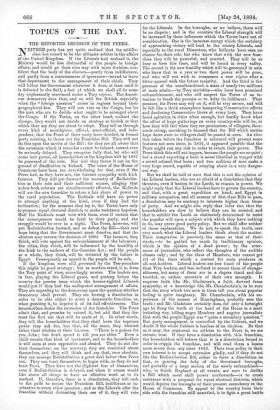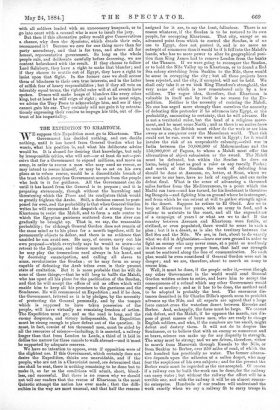TOPICS OF THE DAY.
THE REPORTED DECISION OF THE PEERS.
NEITHER party has yet quite realised that the middle- class has ceased to be the ultimate arbiter in the affairs of the United Kingdom. If the Liberals had realised it, the Ministry would be less distrustful of the people in foreign affairs, and would go their own way with more decision, con- fident that the body of the electors—partly from indifference, and partly from a consciousness of ignorance—intend to leave that department to the management of their chiefs. They will follow the Government whatever it does, at least until it is defeated in the field, a fact of which we shall all be some day unpleasantly convinced under a Tory regime. The Ameri- can democracy does that, and so will the British, especially when the " foreign question " arises in regions beyond their geographical ken. They will not vote on the Congo, but for the men who are to decide what ought to be arranged about the Congo. If the Tories, on the other hand, realised the change, they would not decide on strategy so foolish as that which they say they are about to adopt. They tell us through every kind of mouthpiece, official, semi-official, and inde- pendent, that the Peers of their party have decided, in formal party meeting, to throw out the Franchise Bill. They will not do this upon the merits of the Bill ; for they are all aware that the extension which it concedes cannot be refused, cannot even be seriously delayed. They recognise fully that, let who will come into power, all householders in the kingdom will by 1887 be possessed of the vote. Nor will they throw it out on the ground of disaffection in Ireland. The votes of the House of Commons have been too overwhelming for that, even if the Peers had, as they have not, the faintest sympathy with Irish farmers. They will put forward the necessity of Redistribu- tion as their sole and their sufficient excuse, alleging that unless both reforms are simultaneously effected, the Radicals will use the new franchise to refuse a fair share of power to the rural population.. The Radicals will have no power to attempt anything of the kind, even if they had the inclination ; for the moment they try it, the Tories have only to propose equal electoral districts to make resistance hopeless. Half the Radicals must vote with them, even if certain that the consequences would be fatal to their party, and the struggle would be over in a night. The Peers, however, will put Redistribution forward, and so defeat the Bill—their real hope being that the Government must dissolve, and that the electors may reverse the decision of 1880. The farmers, they think, will vote against the enfranchisement of the labourers ; the cities, they think, will be influenced by the hostility of the Irish to the authors of the Coercion Act ; and the people as a whole, they think, will be irritated by the failure in Egypt. Consequently an appeal to the people will be safe.
If the kingdom were still governed by the Ten-pounders this might be good strategy ; but as matters stand, it is, from the Tory point of view, exceedingly unwise. The leaders are, in fact, playing the Liberal game, and putting before the country the precise issue which the keener-sighted Liberals would put if they had the undisputed arrangement of affairs. They are appealing to the democracy upon the question whether democracy shall prevail. They are forcing a dissolution in order to be able either to avert a democratic franchise, or, when granting it, to deprive it of its full effectiveness. The householders desire the extension of the franchise. The Peers admit that, and promise to extend it, but add that they dis- trust the first use that will be made of it. In other words, they tell the householders that they shall have the supreme power they ask for, but that, all the same, they distrust _ either their wisdom or their fairness. " There is a guinea for you, John ; but don't spend it till you are older." Even a child resents that kind of treatment, and to the householders it will seem at once oppressive and absurd. They do not dis- trust themselves ; on the contrary, they are conceited about themselves, and they will think and say that, once absolute, they can manage Redistribution a great deal better than Peers can. They can trust themselves, to begin with, as they do not trust Peers. They have not the slightest fear of themselves, even if Redistribution is delayed, and when it comes would like above all things to have an effective word as to its method. If, therefore, there is a dissolution, they will rush to the polls to secure the Franchise Bill, indifferent or in- attentive to every other question ; and as the Liberals offer the franchise without distrusting their use of it, they will vote
for the Liberals. In the boroughs, as we believe, there will be no dispute ; and in the counties the Liberal strength wilt be increased by three influences which the Tories leave out of consideration. One is the immense energy which the certainty of approaching victory will lend to the county Liberals, and especially to the rural Dissenters, who hitherto have seen no chance for their side, but who know that with the new fran- chise they will be powerful, and courted. They will be as busy as bees this time, and will be heard in every valley. The second is the new timidity which will be generated in men who know that in a year or two their power will be gone, and who will not wish to commence a new regime after a bitter quarrel with the future majority. And the third is the pressure of the unenfranchised, a mass of nearly two millions of male adults,—by Tory statistics—who have been promised enfranchisement, and who will suspect the Tories of an in- tention to break the promise or to delay its fulfilment. That pressure, the Peers may rely on it, will be very severe, and will be felt like a thick atmosphere hampering Conservative efforts and deadening Conservative blows at every turn. They have faced agitation in cities often enough, but hardly know what the effect of huge gatherings on every country-side will be, or how they will feel when they see processions of villagers, thou- sands strong, marching to demand that the Bill which carries hope down even to villagers shall be passed at once. An elec- tion taken before the franchise is reformed will present some features not seen since, in 1831, it appeared possible that the Peers might run any risk in order to retain their power. The Peers think this will not happen, because the people are so quiet ; but a crowd expecting a boon is never identical in temper with a crowd refused that boon ; and two millions of men make a very large crowd, capable of swaying about in a very danger- ous way.
But we shall be told at once that this is not the opinion of the Liberal leaders, who are so afraid of a dissolution that they threaten, even if beaten in the Lords, to remain in power. We might reply that the Liberal leaders have to govern the country,. and that, with a great expedition on hand, and Egypt in military occupation, and all manner of first-class Bills to pass, a dissolution may be contrary to interests higher than those of party. And we might also reply that tides rise, that the householders are slow to believe they can be resisted, and that to exhibit the Lords as obstinately determined to resist the popular will upon a subject with which they have nothing to do, may prove good party policy. But we shall offer neither of those explanations. We do not, to speak the truth, care very much what the Liberal leaders think about the matter. Their temptation is precisely the same as that of their rivals,—to be guided too much by traditionary opinion, which is the opinion of a dead power ; by the utter- ances of journalists, who reflect the thoughts of the audible classes only ; and by the ideas of Members, who cannot get rid of the fears which a contest for seats produces in all seat-holders. Liberal leaders are less timid of the people than Tory leaders, and less inclined to accuse them of change- ableness, but many of them are in a degree timid And dis- trustful, or, rather, uncertain of their own strength. It requires faith like Mr. Gladstone's, a faith derived from sympathy, or a knowledge like Mr. Chamberlain's, to be sure that the story which two men in three tell you about popular feeling is quite imaginary. Mr. Chamberlain, with his ex- perience of the masses of Birmingham, probably sees the truth ; and Mr. Gladstone certainly does, for only a fortnight ago he flung the truth at the head of the House in a most irritating way, telling angry Members and angrier journalists that with the people Egypt was " quite a secondary question." But party management is controlled by the Cabinet, and we doubt if the whole Cabinet is fearless of an election. Be that as it may, the argument we address to the Peers is, we are certain, true. If they force a dissolution with this franchise, the householders will believe that it is a dissolution forced in order to cripple the franchise, and will read them a lesson more severe than any since 1832. Their true policy in their own interest is to accept extension gladly, and if they do not like the Redistribution Bill, either to force a dissolution on that, so gaining the help of the threatened boroughs, and probably of a large section of the newly enfranchised— who, in South England at all events, are sure to dislike a Bill which must shift power northwards—or to crush resistance with a proposal for equal electoral districts, which would deprive the boroughs of their present ascendency in the House of Commons. To appeal to the country from their side with the franchise still unsettled, is to fight a great battle
with all soldiers loaded with an unnecessary knapsack, or to go into court with a counsel who is sure to insult the jury.
But then if this alternative policy would give Conservatives a chance, why does the Spectator, which dreads their rule, recommend it Because we care for one thing more than for party ascendency, and that is for true, and above all for honest, representative government. So long as the whole people rule, and deliberate carefully before decreeing, we are content beforehand with the result. If they choose to follow Lord Salisbury, they have a right to make that blunder ; and if they choose to scuttle out of Egypt, they have a right to insist upon that flight. In the former case we shall accuse them of blindness to their own true interests, and in the latter of selfish fear of heavy responsibilities ; but if they all vote on tolerably equal terms, the rightful ruler will at all events have spoken. Demos will make heaps of blunders like every other king, but at least he will reign of right ; and as he must reign, we advise the Tory Peers to acknowledge him, and see if they cannot gain his ear. They certainly will not gain it by ostenta- tiously expressing their resolve to impugn his title, out of dis- trust of his impartiality.

































 Previous page
Previous page